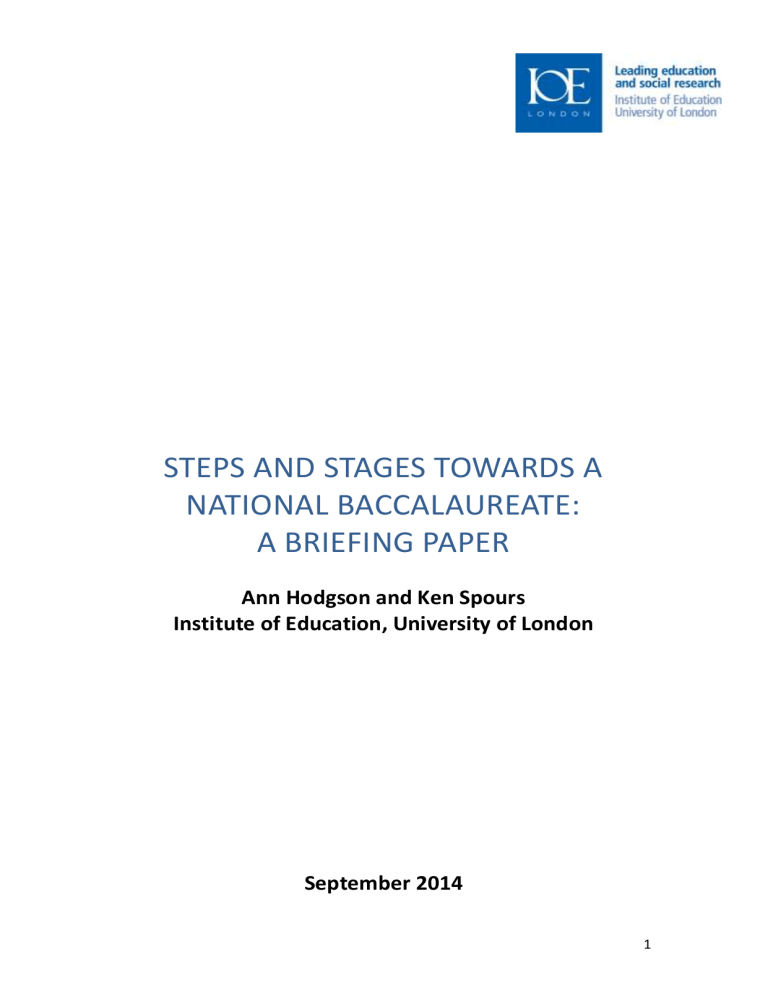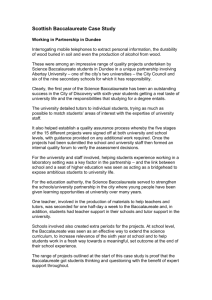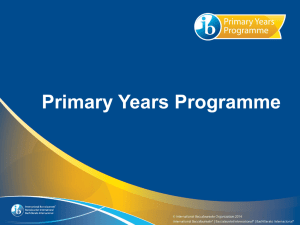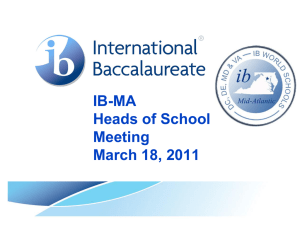Three stages of National Baccalaureate development and

STEPS AND STAGES TOWARDS A
NATIONAL BACCALAUREATE:
A BRIEFING PAPER
Ann Hodgson and Ken Spours
Institute of Education, University of London
September 2014
1
Building an alliance to support the National Baccalaureate
1. The aim of this draft briefing paper is to explore incremental steps and stages in the development and implementation of a National Baccalaureate Qualification
System in England that was recommended in the third report of the Independent
Task Force chaired by Professor Chris Husbands - Qualifications matter: improving the curriculum and assessment for all.
2. In building on the work of the Independent Task Force we start by making a case for a balanced, consultative, bottom-up and staged approach to the development and implementation of the National Baccalaureate (NB) capable of commanding widespread support and harnessing the knowledge and experience of stakeholders not only in the English education system, but also across the other countries of the UK.
Strengthening vocational education and enhancing general education
3. The report of the Task Force rightly stressed that a baccalaureate approach should aim to strengthen vocational education (vocational qualifications and programmes of study) in order to meet the needs of the ‘forgotten 50%’. At the same time it stated that the NB should accredit the outcomes of a universal upper secondary phase (14-19 in the case of England) for all learners. If it is to fulfil this broader function and command widespread support, the baccalaureate framework will have to demonstrate a balanced and universal approach. This will mean, for example, making clear how it will be able to improve the experience and outcomes of both those taking a vocational route and also those specialising in general education through A Levels. We think it is important that the NB is able to gain an early reputation for enhancing academic study and developing research skills that aids progression to higher education as well as promoting a high quality technical education.
2
Involving stakeholders from the ground floor upwards
4. Moreover, we think it important that the policy and implementation process marks a break with previous top-down approaches to qualifications development and implementation. This could mean making clear that a range of stakeholders (e.g. teachers/lecturers, parents, students, employers, HEIs) can be involved in developing its curriculum principles, design and the means of successful implementation.
5. There is a great deal of knowledge and experience that a Labour Government will be able to draw upon because baccalaureate-type qualifications have been widely debated in 14-19 education and training England over the last 25 years; there are several baccalaureate models either being proposed or being implemented on a local scale and there is a Welsh Baccalaureate that is itself moving through stages of development. Furthermore, the involvement of practitioners from a variety of schools, colleges and workplaces will ensure a rich vein of good practice informs the framework from the beginning.
A consensual and sustainable project
6. The recommendations of the Task Force report represent a great opportunity to build an enduring consensus for a baccalaureate framework that could be seen as a historic step in the development of English qualifications in the 21 st Century. By
‘consensual’ we are referring to the development of what should be a widely accepted set of guiding principles; the search to improve the quality of all types of learning and to take a consultative and gradualist path of development and implementation that genuinely tries to bring everyone on board.
7. The first step could be a discussion of the fundamental aims of the NB framework. We think that these should be broadly cast and very explicit (e.g. aiming to improve both the quality of vocational and general education; increasing levels of attainment in the upper secondary phase, particularly at Level 3; fostering a broad set of capacities that help young people engage with higher education; employment and wider society). A universal upper secondary phase, as other countries recognise, requires guiding principles the aspirations of the system and that become reflected
3
in the qualification that represents ‘graduation’ and transition to higher study or working life.
8. At the same time, it will be important to ‘go with the flow’ of political debate about 14-19 education and to create an expansive and modernised version of standards based on the ‘world of and’ (e.g. rigorous and inclusive; embracing both general and vocational education; promoting up-to-date ‘powerful subject knowledge’ and the fundamental ‘21 st Century Competences’ that can straddle and enrich both general and vocational learning).
9. In practical terms the expansive curriculum of the NB could include the continuation of the fundamental literacies of English and Mathematics up to 18/19; technological and scientific capability; research and inquiry skills; societal skills of collaboration and personal attributes such as curiosity and perseverance. These are reflected in the proposed four components of the NB, but require greater discussion, elaboration and agreement.
Three stages of National Baccalaureate development and implementation
10. The NB is an ambitious and expansive project that should not be rushed.
Developed through carefully crafted steps and stages, it will have the chance to gather support and to be shaped by ‘policy learning’ and the experience of practitioners from independent schools to further education colleges and to the workplace.
11. It is recommended that the NB be developed, designed and implemented through three broad and overlapping stages:
4
1. Preparatory Stage – consultation, design and capacity building.
2. Framework Stage - implementation of the first version of a National
Baccalaureate.
3. Refinement Stage – the review of the first version and its transition into a ‘Mk 2 model’.
12. This process will span more than one Parliament so it is desirable to work for a cross-party agreement and for stakeholders rather as well as ministers to be put in the driving seat of what is a long-term project.
Stage 1. Preparation – consultation, design and capacity building
13. Very few people in education, and more so wider stakeholders such as employers, are aware of the proposals of the Independent Task Force. It will be important, therefore, to involve as many people as possible so that the NB becomes seen as much as ‘common property’ as a Labour Government policy initiative.
During the Preparatory Stage, therefore, it will be necessary to focus on the precursors of long-term success – consensus making; capacity building and creating a favourable governance environment at the local level.
14. Consultation will involve the consensus-building measures discussed in the previous section and the confirmation and shaping of the main recommendations of the Task Group report including, for example, the proposal of four curriculum components; the number of levels to be initially included; its scope and how it might be used as a framework for Apprenticeships; the General/Technical distinction and other possible approaches to nomenclature; and the system of assessment. It will also be important to get agreement on a ‘staged approach’, its timescales and resourcing.
15. Following the confirmation and elaboration of the NB model or framework it will be possible undertake curriculum capacity building to develop the key components of the preferred model and local curriculum frameworks that foster
5
institutional capacities to offer it. This precursor improvement and capacity building strategy could include: a.
Improving the curriculum design and pedagogy of vocational and general qualifications that will form the main specialised component of the baccalaureate. b.
Developing the research project component in particular so that it can be scaled up beyond the minority of students who currently undertake the
Extended Project Qualification; to ensure that it will be regarded as a high status component and that it has the explicit support of higher education and employers. c.
Encouraging the development of other components of the NB in schools, colleges and the Apprenticeship route so that it emerges not only as a national framework, but also as an expression of bottom-up local and institutional innovation and professional development.
16. The success of this qualifications strategy will depend not only on its ‘content’ but its ‘context’. It is critical, therefore, to create a favourable policy and governance environment that not only sees the shaping influence of ‘national policy levers’ such as funding and inspection but, arguably more importantly, the creation of a more bottom-up collaborative movement at the local level. This will mean, for example, the strengthening of local 14-19 partnership working so that all providers in an area are able to pool and share their expertise and experience to develop the curriculum components of the NB in their various institutional settings. The nurturing of strong local development networks could be seen as the point of connection between
Labour’s Middle Tier Review and its emergent 14-19 curriculum and qualifications strategy.
6
Stage 2. Using existing qualifications within an overarching National Baccalaureate
Framework (Version 1 of the NB)
17. It is envisaged the NB will evolve through various versions over time in which the overarching framework becomes stronger and existing qualifications are gradually transformed into the components of a fully-fledged baccalaureate.
18. We suggest that the first step be the creation of an Advanced Level NB because this is where the curriculum is urgently requires broadening, Level 3 study now comprises the majority of 14-19 year olds and because this level should represent overall achievement at the end of the upper secondary phase. It is also important that the NB framework be associated with higher-level achievement rather than lower level study and is able to become an expression of a learner’s
‘programme of study’ at advanced level.
19. In practical terms, Version 1 of an Advanced NB could comprise existing general and vocational qualifications, Component 1 of the proposed NB together with a ‘Core’ of learning that brings together the other three components (Research
Project; Personal Development and Maths/English). At this stage the ‘Core’ could be regarded as an additional qualification (as was the case with Version 1 of the Welsh
Bac) and awarded UCAS points or awarded ‘credit’ as part of an overall grade for the
NB. The latter approach is technically complicated and might take time. This will be a particular tactical decision that a new government will have to take.
20. Either way, the additional components will impose extra formal demands on advanced level learners. This risks criticism by traditionalists arguing that these could detract from specialist subject attainment required for university entrance (the
Welsh Bac experienced such an attack quite recently based on the attainment of
Welsh Bac students in HE). We think, therefore, that it is important that the NB be very focused on progression skills and that the research project has pride of place.
7
21. At the same time, the reputation of the NB will not only be secured through its role in enhancing culturally dominant general education, but also through its original intention to improve the quality of vocational education. Here it will be important to involve further education colleges, employers and Apprenticeship providers to explore the possibility of an Apprenticeship version of the Tech Bacc and to ensure that the NB reinforces ‘strongly vocational learning’ that is closely aligned with future labour market needs. In addition, it will be important that students who enter the work-based route can use that new experience to complete their NB possibly beyond the age of 19.
22. If this more pragmatic path for both general and vocational education was to be taken, the NB as an overarching curriculum and qualification framework could be operational in a year or so and we are confident there are many providers with experience of baccalaureate-style awards that will want to step up to the plate to be part of an ‘experimental and piloting phase’. This will ensure that the Version 1 of the NB is fully infused with institutional good practice in all types of learning; that capacity building gets underway and we get a good practical grasp of how the additional components not only develop wider capacities but also enrich subject specialist study and technical vocational practice.
23. There will, of course, be demand for a Level 2 NB because only 70 per cent of learners currently achieve Level 3 by 19. There is also a moral case of a Level 1 version for full inclusivity. These NBs could have broadly the same
Specialisation/Core design of the Advanced NB, but with lower level demands and a greater focus on the fundamental literacies of maths and English. However, it is important that a Labour Government has ambition to raise the overall level of attainment by 19. We would, therefore, strongly recommend the development of what has been referred to as ‘Level 2.5’ in which a learner with a fragile GCSE profile at 16 is able to take three years to achieve an Advanced Level NB. If a Labour
Government wants to raise the bar and to close the class gap it has to create a ramp or gradient that the vast majority of learners are able to climb over time by virtue of hard work and good support.
8
24. There is also the vexed question of the future of GCSEs at 16. In the longer term the focus of attainment has to switch emphatically to 18 and 19 given the emergence of a universal phase of upper secondary education. In the short-term, however, we would urge a pragmatic path by retaining GCSEs, but creating more space for 14-16 year olds to engage in other types of intellectual activity (e.g. a research project; work-related activities and a focus on progression skills to be able to cope with advanced level study). This approach could benefit from a focus on
‘best 8 GCSEs’ which is a good predictor or success at advanced level thus leaving curriculum space for the activities that teachers have repeatedly stated are needed to develop mature learners.
25. The NB even in its initial forms will benefit from changes to assessment.
Some elements would require more internal teacher-led and collaborative approaches to assessment in order to ensure validity and to avoid excessive testing or ‘box ticking’. However, systems would need to be put in place to underpin standards and to moderate outcomes. While there is clearly a need for a national co-ordinating body, such as Ofqual, there is also potentially a strong role for local networks of providers offering peer review, possibly with ‘chartered examiners’ to provide specialist expertise at the local level.
Stage 3 – Evaluation, refinement and more advanced design
26. The Framework Stage could last for several years. However, if cross-national policy learning was to take place between England and Wales for example, the emergence of a Mk 2 NB could happen more quickly due to the experience of the
Welsh Bac which is now entering its second iteration.
27. A Mk 2 version could well see the development a more cohesive and integrated NB that look less like a wrap around curriculum and qualifications framework and more like a fully formed baccalaureate. While the precise nature of
Stage 3 is a matter of speculation, it is likely to see a more ambitious and integrated
Core (those elements beyond the specialist subjects); the re-engineering of specialist
9
subject blocs so all components of the NB fit together seamlessly; bringing Level 2 attainment into its attainment profile so that the NB reflects 14-19 attainment as a whole; developing a ‘points system’ to underpin grading and more devolved forms of assessment around the research project.
28. Stage 3 could also see the integration of the NB into the wider curriculum and governance landscape to head up the development of strongly collaborative local learning systems. It is quite possible that a looser and more flexibly constructed
National Curriculum could be extended to 18/19 and the NB seen to represent the agreed curriculum principles and goals of what is currently termed Key Stage 5. This expansive curricular version of the NB could become the main focus of local and subregional collaboration bringing teachers, lecturers, students, parents, employers, higher education and local government agencies into close strategic co-operation so that the NB is not only the nationally accepted and respected outcome at end of upper secondary education, but also imbued with distinctive local and regional flavours.
10






